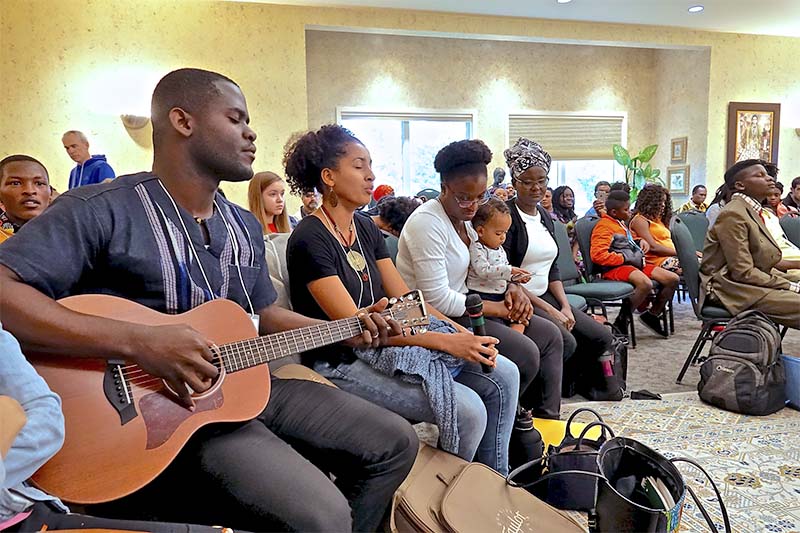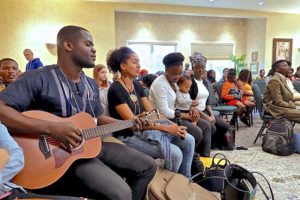



Under the shade of an enormous tree, Baha’is in the Cleveland, Ohio, area met on Aug. 4 for what one participant called their “best cluster reflection meeting ever.”
Reflection meetings are held every three months to review Baha’i-initiated community-building efforts in a cluster of communities and make plans for the next three months.
Attendance at these gatherings in the Cleveland area had flagged in recent years, says Ron Frazer, a member of the appointed Area Teaching Committee that coordinates community-building activity.
But the August reflection drew more than 50 Baha’is, and the main reason was the participation of five Congolese Baha’i families.
“Most of them have been in Cleveland for a few years, but we’ve struggled with communication since none of the adults have been proficient in English,” says Frazer.
In recent months Google Translate and Facebook Messenger have been used to exchange messages with the Congolese families in English, Swahili and French.
Frazer says language continues to be a challenge, though, since the older adults who were born in the Congo speak French, Lingala and other languages while the children and youths who were born in refugee camps in Tanzania speak mostly Swahili.
The communication gap is quite frustrating for all concerned, says Frazer. “These families are dedicated Baha’is who had been accustomed to almost daily Baha’i activities in the camps.
“While they haven’t criticized the rest of us, we’re pretty sure the American schedule of monthly Feasts and an occasional devotional meeting must seem a bit lackadaisical.”
So, while these families struggle to learn English, “the rest of us are struggling to accelerate our Baha’i lives to a point that matches the enthusiasm of our African friends,” says Frazer.
“Very animated consultation” at the reflection meeting focused on urgently developing all the core activities of community building, he says, and devising a plan to share the teachings of Baha’u’llah, prophet-founder of the Baha’i Faith, with neighbors of the Congolese.
“It was completely in African languages, facilitated by Kyengye Elale, a youth from Akron who is quite proficient in English,” says Frazer. “He was able to keep the non-Africans aware of what was being discussed.”

About three weeks after the reflection, three carloads of Cleveland-area Baha’is traveled to Louhelen, a Baha’i center of learning in Davison, Michigan, for the first African Community-Building Conference.
Sponsored by the National Spiritual Assembly, the elected Baha’i governing council for the United States, the conference attracted people representing seven equatorial African nations
“The few conference attendees who were from a European background found themselves faced with challenges,” says Frazer.
“First, how can we help these recent immigrants who, although they strongly desire to serve the Faith, are held back by a lack of fluent English, time or resources?” he reflects. “Secondly, how can we learn from them? How can we replace the ‘rugged individualism’ that we are taught as children in this country with a healthy sense of community?”
Indeed, building a healthy sense of community has been foremost in the minds of Cleveland-area Baha’is since the reflection meeting and the African conference.
One outcome “was the creation of a Facebook group and a WhatsApp group to facilitate communication among the African families and with the English-speaking Baha’is,” says Frazer.
“The [teaching committee] posts messages and asks questions in both English and Swahili using Google Translate, which has been found to be effective if we reverse the translation, i.e. we translate English into Swahili then translate the Swahili back into English.”
The English must be continually tweaked “until the translation is correct in both directions,” he says — and those messages are posted in both languages only after the committee is satisfied with their accuracy. “Without the reversed translation, American and Baha’i idioms can create confused Swahili.”
Beyond that, says Kyengye Elale, the reflection and conference have given the African Baha’is a “vision” of how to advance the process of community building as well as “courage” and inspiration to make it a reality.
Elale himself is “serving more in my community [Akron] by sharing … material that we learned at Louhelen.”
And he teamed with his father to invite six families from the greater community to a devotional gathering. Seven adults from those families came, says Elale, “and we did prayers and ate together.”


![]()
![]()
Whether you are exploring the Bahá'í Faith or looking to become an active member, there are various ways you can connect with our community.
Please ensure that all the Required Fields* are completed before submitting.